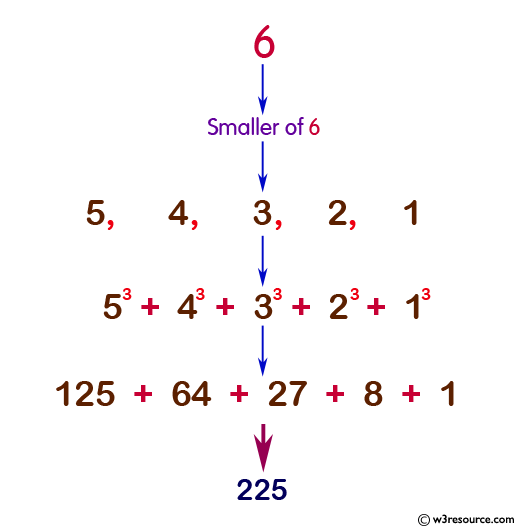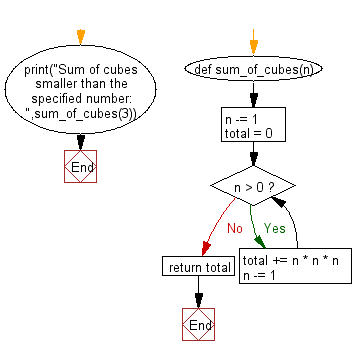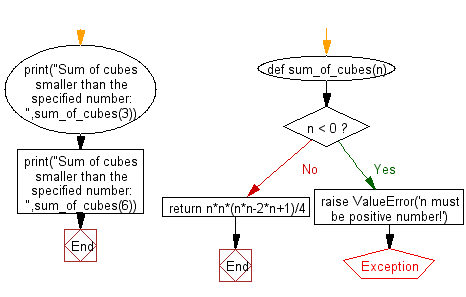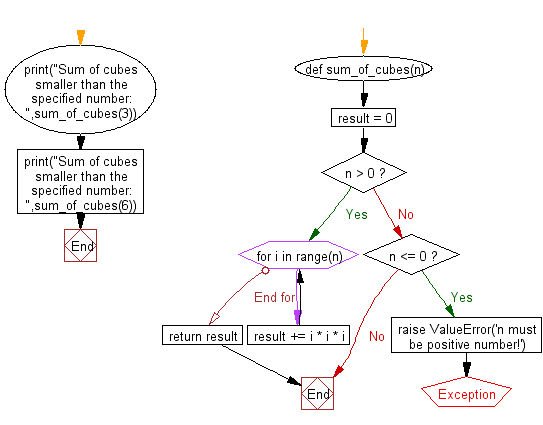Python: Function that takes a positive integer and returns the sum of the cube of all the positive integers smaller than the specified number
Cube Sum of Smaller Integers
Write a Python function that takes a positive integer and returns the sum of the cube of all positive integers smaller than the specified number.
Ex.: 8 = 73+63+53+43+33+23+13 = 784
Sample Solution-1:
Python Code:
# Define a function named 'sum_of_cubes' that takes an integer 'n' as its argument.
def sum_of_cubes(n):
# Decrement 'n' by 1 to exclude 'n' itself from the sum.
n -= 1
# Initialize a variable 'total' to keep track of the sum of cubes.
total = 0
# Use a 'while' loop to iterate through numbers from 'n-1' down to 1.
while n > 0:
# Calculate the cube of the current number 'n' and add it to 'total'.
total += n * n * n
# Decrement 'n' by 1 for the next iteration.
n -= 1
# Return the total sum of cubes.
return total
# Call the 'sum_of_cubes' function with an argument '3' and print the result.
print("Sum of cubes smaller than the specified number: ", sum_of_cubes(3))
Sample Output:
Sum of cubes smaller than the specified number: 9
Pictorial Presentation:

Flowchart:

Sample Solution-2:
Python Code:
# Define a function named 'sum_of_cubes' that takes an integer 'n' as its argument.
def sum_of_cubes(n):
# Check if 'n' is less than 0, and if so, raise a ValueError with a specific message.
if n < 0:
raise ValueError('n must be a positive number!')
# Calculate the sum of cubes using the formula (n^2 * (n^2 - 2n + 1)) / 4.
# This formula is derived from the sum of the first 'n' cubes.
return n * n * (n * n - 2 * n + 1) / 4
# Call the 'sum_of_cubes' function with an argument '3' and print the result.
print("Sum of cubes smaller than the specified number (n=3): ", sum_of_cubes(3))
# Call the 'sum_of_cubes' function with an argument '6' and print the result.
print("Sum of cubes smaller than the specified number (n=6): ", sum_of_cubes(6))
Sample Output:
Sum of cubes smaller than the specified number: 9.0 Sum of cubes smaller than the specified number: 225.0
Flowchart:

Sample Solution-3:
Python Code:
# Define a function named 'sum_of_cubes' that takes an integer 'n' as its argument.
def sum_of_cubes(n):
# Initialize a variable 'result' to store the sum of cubes.
result = 0
# Check if 'n' is greater than 0.
if n > 0:
# Iterate through numbers from 0 to 'n-1' and add the cube of each number to 'result'.
for i in range(n):
result += i * i * i
# Return the calculated 'result'.
return result
# If 'n' is not greater than 0, raise a ValueError with a specific message.
elif n <= 0:
raise ValueError('n must be a positive number!')
# Call the 'sum_of_cubes' function with an argument '3' and print the result.
print("Sum of cubes smaller than the specified number (n=3): ", sum_of_cubes(3))
# Call the 'sum_of_cubes' function with an argument '6' and print the result.
print("Sum of cubes smaller than the specified number (n=6): ", sum_of_cubes(6))
Sample Output:
Sum of cubes smaller than the specified number: 9 Sum of cubes smaller than the specified number: 225
Flowchart:

For more Practice: Solve these Related Problems:
- Write a Python program to calculate the sum of squares of all positive integers smaller than a given number.
- Write a Python function to find the sum of the fourth power of all positive integers less than a given number.
- Write a Python program to find the sum of cubes of only even integers smaller than a given number.
- Write a Python function to compute the sum of cubes of all prime numbers below a given integer.
Go to:
Previous: Write a Python function to find the maximum and minimum numbers from a sequence of numbers.
Next: Write a Python function to check whether a distinct pair of numbers whose product is odd present in a sequence of integer values.
Python Code Editor:
What is the difficulty level of this exercise?
Test your Programming skills with w3resource's quiz.
